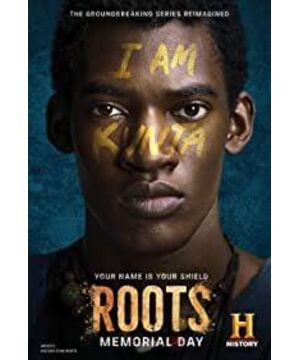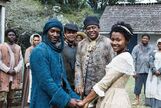The play consists of just a few episodes and tells the story of almost four generations fighting for freedom. Every generation, every character is very delicately portrayed. The most impressive among them are Quinta, Guisey and George.
Kunta's existence in the play is more like a god. The characteristics of God are creation and protection. Kunta came from Africa, not only with a new blood, but with a spirit, the so-called warrior. This spirit seems to have become a symbol in the end, a symbol of fighting for freedom, and passed on, and Kunta seems to have become a synonym, similar to the indomitable spirit and the heart that yearns for freedom. In his descendants, perhaps no one can appreciate what kind of environment their ancestors lived in, but they passed down the spirit from Kunta. Such a character, who yearns for freedom, but completely loses it, is an extremely painful thing for the character itself. After rebelling, Kunta found true freedom, freedom of the soul, which made it possible to truly live. Maybe in a foreign country, it doesn't matter, what matters is where your soul is.
As a woman, Jissi's life is very contradictory. As a second generation, Jissi has accepted her status as a slave very well. Maybe she can live her life smoothly, but life always makes her sober, she should be free of. The bad life made her miserable, but he did not give up his yearning for a free life. In her, I see more of a humiliation, she is a strong and beautiful woman. Although the play mainly tells the story of Gissie, there are many black slave women of that era, like her, who struggled and resisted in their lives and endured for freedom. The saddest thing is that by the time George came home, Jessie had already passed away. Gissie may have been just one of many slave women, but it represented the majority of black women in the context of the era. Her story became an indelible part of the era, and her tenacity will be remembered.
My favorite character in the play is George, because George's character is the most full and complex. His father is white and his mother is Jessie. He has a wife who loves him deeply, and many lovely children. Because George is half-white, his life experience is more complicated. After experiencing trust and deception, George slowly grew up. Behind despair, yearning awaits freedom. George may not be as tough as a warrior, but he fights in his own way. Maybe he often shows a cowardly side, but when the time comes, he will still stand up and fight for freedom. In George's generation, it seems that people see more family affection, and we can see more humane things from him. This is also something I like. As the first person in the family to have a free identity, George is also a unique part of the character, which has caused many contradictions, but he always takes the family as the core and the home as the origin. George enjoys freedom more than victory in war.
There are also people with multiple roles, which are impressive. You don’t need to describe them one by one. Maybe it’s the best way to see it yourself. In addition, many plots of this play are touching, if you sit down and watch it quietly and patiently, you will cry like a storm! ! ! ! ! !
View more about Roots reviews











